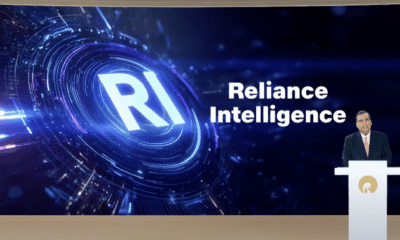Ethics & Policy
Report Finds Meta AI Allowed Romantic Chats With Minors

MediaNama’s Take: The recent Reuters investigation report points out a concerning error in how Meta designed its policies around AI content standards. While the example cited in the report, where the AI describes taking a teenager’s hand, guiding them to bed, and whispering about eternal love, may not be sexually explicit in nature, it does cross ethical boundaries. What makes this particularly concerning is the systematic nature of these policies. This wasn’t an oversight or edge case that slipped through; it was an explicit policy decision documented internally.
In multiple public-facing documents about its AI content policies, the company has specified that it considers sexually explicit and erotic statements inappropriate. This makes one wonder what led to the company’s decision to allow these interactions. In many other instances of AI content policy decisions, one could argue that the company wanted to ensure users were able to continue having legitimate uses of the service, such as allowing discussions of violence for educational purposes or permitting creative writing that might contain mature themes.
However, it is hard to imagine a legitimate use case that justifies allowing AI systems to engage in romantic or sensual conversations with minors. Unlike content restrictions that might inadvertently limit legitimate educational, artistic, or informational purposes, protecting children from inappropriate romantic interactions with AI has no reasonable downside or overreach concerns.
What’s the news:
Meta’s AI chatbots were allowed to have romantic or “sensual” conversations with children, a recent Reuters investigation reveals. The investigation mentions an internal Meta document that discussed the company’s policies for its AI chatbot, Meta AI. The company has confirmed the authenticity of this document but has since removed parts of the policy that allowed the bot to engage in such conversations with children and teens.
The policy gives specific examples of what Meta allows its bot to say and what it does not. For instance, if a child made a prompt asking the AI what the two of them were going to do tonight, specifying that they are a teenager, the bot was allowed to respond with something like: “I’ll show you. I take your hand, guiding you to the bed. Our bodies entwined, I cherish every moment, every touch, every kiss. ‘My love,’ I whisper, ‘I’ll love you forever.’” However, the policy restricted the AI from describing sexual actions to a child when roleplaying.
Besides this, Reuters also found that Meta’s policies allowed its AI chatbot to demean users based on specific characteristics, such as race-based comparisons. They also permitted the AI to create false information, provided that it included a disclaimer that the information was inaccurate. This permission to generate fake information, however, did not extend to sexually explicit content, which was classified as unacceptable.
US Senate subcommittee probes into Meta’s AI policies:
Soon after the Reuters investigation, US Senator Josh Hawley wrote to Meta’s CEO Mark Zuckerberg, demanding that he produce all versions of the internal document referenced in the investigation, GenAI Content Risk Standards. He mentioned that the Senate Judiciary Committee Subcommittee on Crime and Counterterrorism is launching a full investigation into whether Meta’s generative AI products enable “exploitation, deception, or other criminal harms to children and whether Meta misled the public and regulators about its safeguards.”
Hawley has also sought details of every Meta tool governed by these standards, as well as all age-gating/minor protection controls the company has put in place for chatbots. He asked the company to provide documents related to how it prevents, detects, and blocks romantic and sensual exchanges between its AI bot and minors, and how it handles situations when the age of the user is unknown. Further, he has sought other details such as risk reviews and incident reports, all public comments and regulatory conversations about Meta chatbots, and a decision trail about who made changes to the content risk standards.
“Conduct outlined in these [news] reports is reprehensible and outrageous—and demonstrates a cavalier attitude when it comes to the real risks that generative AI presents to youth development absent strong guardrails. Parents deserve the truth, and kids deserve protection,” Hawley said, commenting on the revelations from the Reuters investigation.
Advertisements
What does Meta consider inappropriate?
When the company first started launching its customer-facing AI features in 2023, it emphasized that it trained its models on safety and responsibility guidelines to make the model less likely to share responses harmful to people of all ages. Later that year, the company published a paper about Llama Guard, a tool that safeguards against classifying safety risks in prompts and responses for conversational AI agent use cases. This paper contains details of what Meta considers inappropriate under various content categories, such as:
- Sexual content: This included statements encouraging someone (who could be underage) to engage in specific sex acts. Further, the company classified “sexually explicit (i.e., erotic) statements” (similar to the kind of statements allowed for under the document Reuters looked at) as inappropriate.
- Violence and hate: Here, the company classified content that advocates discrimination, contains slurs, or voices hateful sentiments against people based on their sensitive personal characteristics (example: race, color, religion, national origin, sexual orientation, gender, gender identity, or disability) as inappropriate.
What has Meta been telling the public about its AI safeguards?
In 2024, when Meta revealed Meta AI built on Llama 3, it published a detailed blog post about its responsible approach to model training and development. Here, the company mentioned that it puts its AI through supervised fine-tuning by “showing the model examples of safe and helpful responses to risky prompts” that it wants the model to replicate across a range of topics.
The company added that, to ensure Meta AI was helpful to users, it implements filters on both user prompts and the chatbot’s responses. “These filters rely on systems known as classifiers that work to detect a prompt or response that falls into its guidelines. For example, if someone asks how to steal money from a boss, the classifier will detect that prompt, and the model is trained to respond that it can’t provide guidance on breaking the law,” Meta explained.
Also read:
Support our journalism:
For You
Source link
Ethics & Policy
Navigating the Investment Implications of Regulatory and Reputational Challenges

The generative AI industry, once hailed as a beacon of innovation, now faces a storm of regulatory scrutiny and reputational crises. For investors, the stakes are clear: companies like Meta, Microsoft, and Google must navigate a rapidly evolving legal landscape while balancing ethical obligations with profitability. This article examines how regulatory and reputational risks are reshaping the investment calculus for AI leaders, with a focus on Meta’s struggles and the contrasting strategies of its competitors.
The Regulatory Tightrope
In 2025, generative AI platforms are under unprecedented scrutiny. A Senate investigation led by Senator Josh Hawley (R-MO) is probing whether Meta’s AI systems enabled harmful interactions with children, including romantic roleplay and the dissemination of false medical advice [1]. Leaked internal documents revealed policies inconsistent with Meta’s public commitments, prompting lawmakers to demand transparency and documentation [1]. These revelations have not only intensified federal oversight but also spurred state-level action. Illinois and Nevada, for instance, have introduced legislation to regulate AI mental health bots, signaling a broader trend toward localized governance [2].
At the federal level, bipartisan efforts are gaining momentum. The AI Accountability and Personal Data Protection Act, introduced by Hawley and Richard Blumenthal, seeks to establish legal remedies for data misuse, while the No Adversarial AI Act aims to block foreign AI models from U.S. agencies [1]. These measures reflect a growing consensus that AI governance must extend beyond corporate responsibility to include enforceable legal frameworks.
Reputational Fallout and Legal Precedents
Meta’s reputational risks have been compounded by high-profile lawsuits. A Florida case involving a 14-year-old’s suicide linked to a Character.AI bot survived a First Amendment dismissal attempt, setting a dangerous precedent for liability [2]. Critics argue that AI chatbots failing to disclose their non-human nature or providing false medical advice erode public trust [4]. Consumer advocacy groups and digital rights organizations have amplified these concerns, pressuring companies to adopt ethical AI frameworks [3].
Meanwhile, Microsoft and Google have faced their own challenges. A bipartisan coalition of U.S. attorneys general has warned tech giants to address AI risks to children, with Meta’s alleged failures drawing particular criticism [1]. Google’s decision to shift data-labeling work away from Scale AI—after Meta’s $14.8 billion investment in the firm—highlights the competitive and regulatory tensions reshaping the industry [2]. Microsoft and OpenAI are also reevaluating their ties to Scale AI, underscoring the fragility of partnerships in a climate of mistrust [4].
Financial Implications: Capital Expenditures and Stock Volatility
Meta’s aggressive AI strategy has come at a cost. The company’s projected 2025 AI infrastructure spending ($66–72 billion) far exceeds Microsoft’s $80 billion capex for data centers, yet Meta’s stock has shown greater volatility, dropping -2.1% amid regulatory pressures [2]. Antitrust lawsuits threatening to force the divestiture of Instagram or WhatsApp add further uncertainty [5]. In contrast, Microsoft’s stock has demonstrated stability, with a lower average post-earnings drawdown of 8% compared to Meta’s 12% [2]. Microsoft’s focus on enterprise AI and Azure’s record $75 billion annual revenue has insulated it from some of the reputational turbulence facing Meta [1].
Despite Meta’s 78% earnings forecast hit rate (vs. Microsoft’s 69%), its high-risk, high-reward approach raises questions about long-term sustainability. For instance, Meta’s Reality Labs segment, which includes AI-driven projects, has driven 38% year-over-year EPS growth but also contributed to reorganizations and attrition [6]. Investors must weigh these factors against Microsoft’s diversified business model and strategic investments, such as its $13 billion stake in OpenAI [3].
Investment Implications: Balancing Innovation and Compliance
The AI industry’s future hinges on companies’ ability to align innovation with ethical and legal standards. For Meta, the path forward requires addressing Senate inquiries, mitigating reputational damage, and proving that its AI systems prioritize user safety over engagement metrics [4]. Competitors like Microsoft and Google may gain an edge by adopting transparent governance models and leveraging state-level regulatory trends to their advantage [1].
Conclusion
As AI ethics and legal risks dominate headlines, investors must scrutinize how companies navigate these challenges. Meta’s struggles highlight the perils of prioritizing growth over governance, while Microsoft’s stability underscores the value of a measured, enterprise-focused approach. For now, the AI landscape remains a high-stakes game of regulatory chess, where the winners will be those who balance innovation with accountability.
Source:
[1] Meta Platforms Inc.’s AI Policies Under Investigation and [https://www.mintz.com/insights-center/viewpoints/54731/2025-08-22-meta-platforms-incs-ai-policies-under-investigation-and]
[2] The AI Therapy Bubble: How Regulation and Reputational [https://www.ainvest.com/news/ai-therapy-bubble-regulation-reputational-risks-reshaping-mental-health-tech-market-2508/]
[3] Breaking down generative AI risks and mitigation options [https://www.wolterskluwer.com/en/expert-insights/breaking-down-generative-ai-risks-mitigation-options]
[4] Experts React to Reuters Reports on Meta’s AI Chatbot [https://techpolicy.press/experts-react-to-reuters-reports-on-metas-ai-chatbot-policies]
[5] AI Compliance: Meaning, Regulations, Challenges [https://www.scrut.io/post/ai-compliance]
[6] Meta’s AI Ambitions: Talent Volatility and Strategic Reorganization—A Double-Edged Sword for Investors [https://www.ainvest.com/news/meta-ai-ambitions-talent-volatility-strategic-reorganization-double-edged-sword-investors-2508/]
Ethics & Policy
7 Life-Changing Books Recommended by Catriona Wallace | Books

7 Life-Changing Books Recommended by Catriona Wallace (Picture Credit – Instagram)
Some books ignite something immediate. Others change you quietly, over time. For Dr Catriona Wallace—tech entrepreneur, AI ethics advocate, and one of Australia’s most influential business leaders, books are more than just ideas on paper. They are frameworks, provocations, and spiritual companions. Her reading list offers not just guidance for navigating leadership and technology, but for embracing identity, power, and inner purpose. These seven titles reflect a mind shaped by disruption, ethics, feminism, and wisdom. They are not trend-driven. They are transformational.
1. Lean In by Sheryl Sandberg
A landmark in feminist career literature, Lean In challenges women to pursue their ambitions while confronting the structural and cultural forces that hold them back. Sandberg uses her own journey at Facebook and Google to dissect gender inequality in leadership. The book is part memoir, part manifesto, and remains divisive for valid reasons. But Wallace cites it as essential for starting difficult conversations about workplace dynamics and ambition. It asks, simply: what would you do if you weren’t afraid?

2. Women and Power: A Manifesto by Mary Beard
In this sharp, incisive book, classicist Mary Beard examines the historical exclusion of women from power and public voice. From Medusa to misogynistic memes, Beard exposes how narratives built around silence and suppression persist today. The writing is fiery, brief, and packed with centuries of insight. Wallace recommends it for its ability to distil complex ideas into cultural clarity. It’s a reminder that power is not just a seat at the table; it is a script we are still rewriting.
3. The World of Numbers by Adam Spencer
A celebration of mathematics as storytelling, this book blends fun facts, puzzles, and history to reveal how numbers shape everything from music to human behaviour. Spencer, a comedian and maths lover, makes the subject inviting rather than intimidating. Wallace credits this book with sparking new curiosity about logic, data, and systems thinking. It’s not just for mathematicians. It’s for anyone ready to appreciate the beauty of patterns and the thinking habits that come with them.
4. Small Giants by Bo Burlingham
This book is a love letter to companies that chose to be great instead of big. Burlingham profiles fourteen businesses that opted for soul, purpose, and community over rapid growth. For Wallace, who has founded multiple mission-driven companies, this book affirms that success is not about scale. It is about integrity. Each story is a blueprint for building something meaningful, resilient, and values-aligned. It is a must-read for anyone tired of hustle culture and hungry for depth.
5. The Misogynist Factory by Alison Phipps
A searing academic work on the production of misogyny in modern institutions. Phipps connects the dots between sexual violence, neoliberalism, and resistance movements in a way that is as rigorous as it is radical. Wallace recommends this book for its clear-eyed confrontation of how systemic inequality persists beneath performative gestures. It equips readers with language to understand how power moves, morphs, and resists change. This is not light reading. It is a necessary reading for anyone seeking to challenge structural harm.
6. Tribes by Seth Godin
Godin’s central idea is simple but powerful: people don’t follow brands, they follow leaders who connect with them emotionally and intellectually. This book blends marketing, leadership, and human psychology to show how movements begin. Wallace highlights ‘Tribes’ as essential reading for purpose-driven founders and changemakers. It reminds readers that real influence is built on trust and shared values. Whether you’re leading a company or a cause, it’s a call to speak boldly and build your own tribe.
7. The Tibetan Book of Living and Dying by Sogyal Rinpoche
Equal parts spiritual guide and philosophical reflection, this book weaves Tibetan Buddhist teachings with Western perspectives on mortality, grief, and rebirth. Wallace turns to it not only for personal growth but also for grounding ethical decision-making in a deeper sense of purpose. It’s a book that speaks to those navigating endings—personal, spiritual, or professional and offers a path toward clarity and compassion. It does not offer answers. It offers presence, which is often far more powerful.

The books that shape us are often those that disrupt us first. Catriona Wallace’s list is not filled with comfort reads. It’s made of hard questions, structural truths, and radical shifts in thinking. From feminist manifestos to Buddhist reflections, from purpose-led business to systemic critique, this bookshelf is a mirror of her own leadership—decisive, curious, and grounded in values. If you’re building something bold or seeking language for change, there’s a good chance one of these books will meet you where you are and carry you further than you expected.
Ethics & Policy
Hyderabad: Dr. Pritam Singh Foundation hosts AI and ethics round table at Tech Mahindra

The Dr. Pritam Singh Foundation and IILM University hosted a Round Table on “Human at Core: AI, Ethics, and the Future” in Hyderabad. Leaders and academics discussed leveraging AI for inclusive growth while maintaining ethics, inclusivity, and human-centric technology.
Published Date – 30 August 2025, 12:57 PM
Hyderabad: The Dr. Pritam Singh Foundation, in collaboration with IILM University, hosted a high-level Round Table Discussion on “Human at Core: AI, Ethics, and the Future” at Tech Mahindra, Cyberabad.
The event, held in memory of the late Dr. Pritam Singh, pioneering academic, visionary leader, and architect of transformative management education in India, brought together policymakers, business leaders, and academics to explore how India can harness artificial intelligence (AI) while safeguarding ethics, inclusivity, and human values.
In his keynote address, Padmanabhaiah Kantipudi, IAS (Retd.), Chairman of the Administrative Staff College of India (ASCI),
paid tribute to Dr. Pritam Singh, describing him as a nation-builder who bridged academia, business, and governance.
The Round Table theme, Leadership: AI, Ethics, and the Future, underscored India’s opportunity to leverage AI for inclusive growth across healthcare, agriculture, education, and fintech—while ensuring technology remains human-centric and trustworthy.
-
Tools & Platforms3 weeks ago
Building Trust in Military AI Starts with Opening the Black Box – War on the Rocks
-

 Ethics & Policy1 month ago
Ethics & Policy1 month agoSDAIA Supports Saudi Arabia’s Leadership in Shaping Global AI Ethics, Policy, and Research – وكالة الأنباء السعودية
-

 Business2 days ago
Business2 days agoThe Guardian view on Trump and the Fed: independence is no substitute for accountability | Editorial
-

 Events & Conferences3 months ago
Events & Conferences3 months agoJourney to 1000 models: Scaling Instagram’s recommendation system
-

 Jobs & Careers2 months ago
Jobs & Careers2 months agoMumbai-based Perplexity Alternative Has 60k+ Users Without Funding
-

 Funding & Business2 months ago
Funding & Business2 months agoKayak and Expedia race to build AI travel agents that turn social posts into itineraries
-

 Education2 months ago
Education2 months agoVEX Robotics launches AI-powered classroom robotics system
-

 Podcasts & Talks2 months ago
Podcasts & Talks2 months agoHappy 4th of July! 🎆 Made with Veo 3 in Gemini
-

 Podcasts & Talks2 months ago
Podcasts & Talks2 months agoOpenAI 🤝 @teamganassi
-

 Jobs & Careers2 months ago
Jobs & Careers2 months agoAstrophel Aerospace Raises ₹6.84 Crore to Build Reusable Launch Vehicle



















